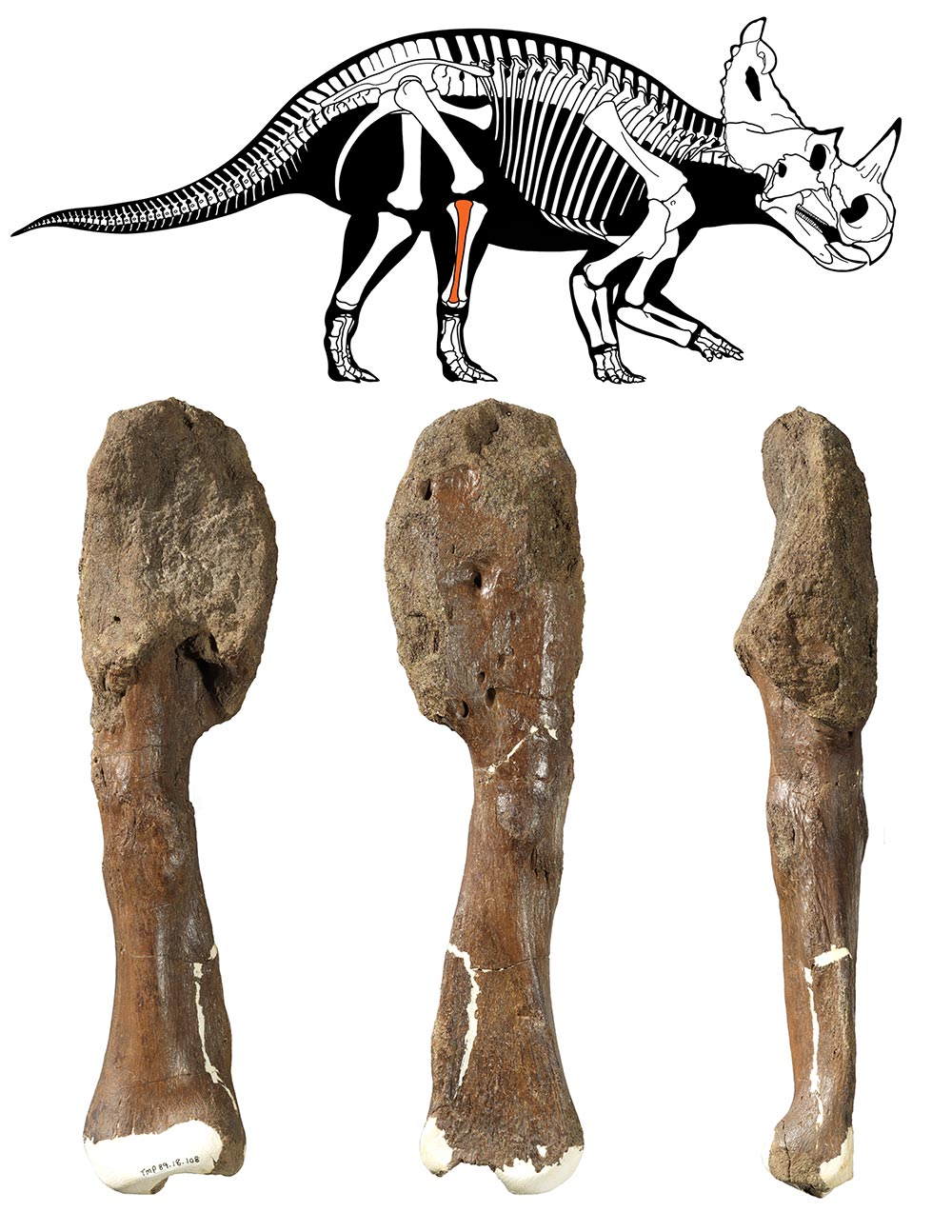最新研究證實:恐龍也會得癌癥
一個加拿大研究團(tuán)隊稱,,他們將史前化石分析技術(shù)與現(xiàn)代人類醫(yī)學(xué)診斷方法相結(jié)合,,發(fā)現(xiàn)了恐龍患惡性腫瘤的第一個明確病例,。
這篇論文周一發(fā)表于醫(yī)學(xué)期刊《柳葉刀腫瘤學(xué)》(The Lancet Oncology),主要研究人員來自多倫多的皇家安大略博物館(Royal Ontario Museum,,ROM)和位于安大略省哈密爾頓的麥克馬斯特大學(xué)(McMaster University),。研究人員表示,這個病例表明包括骨癌在內(nèi)的惡性腫瘤“在生物體進(jìn)化史中早已存在,?!?/font>
研究人員研究了尖角龍的一段小腿骨。這種角龍科恐龍生活在距今約7,600萬至7,700萬年前,。這塊腿骨于1989年出土于加拿大艾伯塔省南部省立恐龍公園(Dinosaur Provincial Park)的一片荒地,。該省立恐龍公園是聯(lián)合國教科文組織(UNESCO)評定的世界自然遺產(chǎn),也是世界上恐龍化石最多的地區(qū)之一,。
2017年,,在艾伯塔省皇家蒂勒爾博物館(Royal Tyrrell Museum)展出的這塊變形的腿骨,引起了前來參觀的研究人員的注意,。研究恐龍和人體病理學(xué)的專家組成了研究團(tuán)隊,,其中還包括整形外科醫(yī)生。
研究人員檢查了這塊腿骨,,制作了模型,,進(jìn)行了高分辨率CT掃描,將骨頭切成了極薄的截面,,并進(jìn)行了細(xì)胞檢查以跟蹤癌細(xì)胞在骨頭中的進(jìn)展情況,,最終診斷這只恐龍患有骨肉瘤。研究人員將這塊腿骨與同類恐龍的正常腓骨,,以及確診患有同類癌癥的人類骨頭進(jìn)行了對比,。

尖角龍屬恐龍示意圖由Danielle Dufault提供圖片由皇家安大略博物館/麥克馬斯特大學(xué)提供,。
骨肉瘤是人類最常見的骨癌,,常見于青少年人群,包括加拿大長跑運動員特里·??怂?。
研究人員在論文中指出,以前很難在恐龍化石中找到癌癥的證據(jù),,不僅是因為骨頭變成化石之后軟組織已經(jīng)消失,,還因為在變成化石的過程中,骨頭本身往往會遭到破壞,。他們進(jìn)一步表示,,恐龍骨化石的稀有性和獨特性也使研究人員不愿意為了進(jìn)行化驗而破壞它們。
麥克馬斯特大學(xué)病理學(xué)與分子醫(yī)學(xué)教授馬克·克勞瑟博士表示:“在恐龍體內(nèi)診斷這種浸潤性癌癥一直無法成功,,這需要醫(yī)學(xué)專業(yè)知識,,并進(jìn)行不同層面的分析后才能做出準(zhǔn)確判定。
在這次研究中,,我們從7,600萬年前的角龍科恐龍身上準(zhǔn)確無誤地找到了晚期骨癌的特征,,這是第一次。這個發(fā)現(xiàn)令人激動不已,?!瘪R克·克勞瑟博士是皇家安大略博物館的志愿者,自稱是一位恐龍愛好者,。
皇家安大略博物館的古生物學(xué)家戴維·埃文斯博士表示,,這只恐龍所患的是浸潤性癌癥,并且處在晚期,,“這可能讓這只恐龍行動不便,,很容易淪為強(qiáng)大的肉食性恐龍的獵物?!?/font>
他懷疑這只大型食草類尖角龍之所以能夠存活更長時間,,可能是得益于龐大族群的保護(hù),否則正常情況下患上這種疾病之后,,它很難長時間存活下去,。
研究人員最后得出的結(jié)論是,這只恐龍可能并非死于癌癥或霸王龍,。
相反,,這只恐龍被發(fā)現(xiàn)的地方是一處龐大的骨床,還有其他化石,,這表明這只恐龍及其龐大的族群死于另外一種長期存在的威脅:洪水,。(財富中文網(wǎng))
翻譯:劉進(jìn)龍
審校:汪皓
一個加拿大研究團(tuán)隊稱,,他們將史前化石分析技術(shù)與現(xiàn)代人類醫(yī)學(xué)診斷方法相結(jié)合,發(fā)現(xiàn)了恐龍患惡性腫瘤的第一個明確病例,。
這篇論文周一發(fā)表于醫(yī)學(xué)期刊《柳葉刀腫瘤學(xué)》(The Lancet Oncology),,主要研究人員來自多倫多的皇家安大略博物館(Royal Ontario Museum,ROM)和位于安大略省哈密爾頓的麥克馬斯特大學(xué)(McMaster University),。研究人員表示,,這個病例表明包括骨癌在內(nèi)的惡性腫瘤“在生物體進(jìn)化史中早已存在?!?/font>
研究人員研究了尖角龍的一段小腿骨,。這種角龍科恐龍生活在距今約7,600萬至7,700萬年前。這塊腿骨于1989年出土于加拿大艾伯塔省南部省立恐龍公園(Dinosaur Provincial Park)的一片荒地,。該省立恐龍公園是聯(lián)合國教科文組織(UNESCO)評定的世界自然遺產(chǎn),,也是世界上恐龍化石最多的地區(qū)之一。
2017年,,在艾伯塔省皇家蒂勒爾博物館(Royal Tyrrell Museum)展出的這塊變形的腿骨,,引起了前來參觀的研究人員的注意,。研究恐龍和人體病理學(xué)的專家組成了研究團(tuán)隊,,其中還包括整形外科醫(yī)生。
研究人員檢查了這塊腿骨,,制作了模型,,進(jìn)行了高分辨率CT掃描,將骨頭切成了極薄的截面,,并進(jìn)行了細(xì)胞檢查以跟蹤癌細(xì)胞在骨頭中的進(jìn)展情況,,最終診斷這只恐龍患有骨肉瘤。研究人員將這塊腿骨與同類恐龍的正常腓骨,,以及確診患有同類癌癥的人類骨頭進(jìn)行了對比,。
骨肉瘤是人類最常見的骨癌,常見于青少年人群,,包括加拿大長跑運動員特里·??怂埂?/font>
研究人員在論文中指出,,以前很難在恐龍化石中找到癌癥的證據(jù),,不僅是因為骨頭變成化石之后軟組織已經(jīng)消失,還因為在變成化石的過程中,,骨頭本身往往會遭到破壞,。他們進(jìn)一步表示,恐龍骨化石的稀有性和獨特性也使研究人員不愿意為了進(jìn)行化驗而破壞它們,。
麥克馬斯特大學(xué)病理學(xué)與分子醫(yī)學(xué)教授馬克·克勞瑟博士表示:“在恐龍體內(nèi)診斷這種浸潤性癌癥一直無法成功,,這需要醫(yī)學(xué)專業(yè)知識,,并進(jìn)行不同層面的分析后才能做出準(zhǔn)確判定。
在這次研究中,,我們從7,600萬年前的角龍科恐龍身上準(zhǔn)確無誤地找到了晚期骨癌的特征,,這是第一次。這個發(fā)現(xiàn)令人激動不已,?!瘪R克·克勞瑟博士是皇家安大略博物館的志愿者,自稱是一位恐龍愛好者,。
皇家安大略博物館的古生物學(xué)家戴維·埃文斯博士表示,,這只恐龍所患的是浸潤性癌癥,并且處在晚期,,“這可能讓這只恐龍行動不便,,很容易淪為強(qiáng)大的肉食性恐龍的獵物?!?/font>
他懷疑這只大型食草類尖角龍之所以能夠存活更長時間,,可能是得益于龐大族群的保護(hù),否則正常情況下患上這種疾病之后,,它很難長時間存活下去,。
研究人員最后得出的結(jié)論是,這只恐龍可能并非死于癌癥或霸王龍,。
相反,,這只恐龍被發(fā)現(xiàn)的地方是一處龐大的骨床,還有其他化石,,這表明這只恐龍及其龐大的族群死于另外一種長期存在的威脅:洪水,。(財富中文網(wǎng))
翻譯:劉進(jìn)龍
審校:汪皓
A group of Canadian researchers say they have discovered the first confirmed case of a dinosaur with malignant cancer—by combining the skills used to analyze prehistoric fossils with modern methods used to diagnose humans.
In a study published Monday in the medical journal The Lancet Oncology, researchers led by Toronto's Royal Ontario Museum (ROM) and McMaster University in Hamilton, Ontario, said the case suggested that malignant tumors, including bone cancers, "are rooted quite deeply in the evolutionary history of organisms."
The researchers examined a lower leg bone from centrosaurus apertus, a horned dinosaur that lived 76 to 77 million years ago. The bone itself was originally discovered in 1989 in the badlands of Dinosaur Provincial Park in southern Alberta, Canada, a UNESCO world heritage site and one of the most dinosaur fossil-rich regions in the world.
The bone, which was visibly malformed, caught the eye of researchers on a trip to Alberta's Royal Tyrrell Museum in 2017. A team of experts across both dinosaur and human pathology was assembled, including orthopedic surgeons.
The researchers examined and cast the bone, performed high-resolution CT scans, and sliced the bone into extremely thin sections, examining it at a cellular level to track the progression of the cancer into the bone, before diagnosing the dinosaur with osteosarcoma. The bone was then compared to a regular fibula bone from the same species of dinosaur, and a human bone with a confirmed case of the same cancer.
Osteosarcoma is the most common form of bone cancer in humans, and is usually found in teenagers and young adults, including the Canadian runner Terry Fox.
In the paper, researchers noted that it has previously been difficult to establish evidence of cancer in dinosaur fossils, not only because soft tissue is lost as the bones fossilize, but because the bones are often damaged in the process. The rarity and uniqueness of dinosaur bones has also made researchers reluctant to destroy them in order to conduct tests, they added.
"Diagnosis of aggressive cancer like this in dinosaurs has been elusive and requires medical expertise and multiple levels of analysis to properly identify," said Dr. Mark Crowther, a professor of pathology and molecular medicine at McMaster University, who is also an avowed fan of dinosaurs and a volunteer at the ROM.
"Here, we show the unmistakable signature of advanced bone cancer in a 76 million-year-old horned dinosaur—the first of its kind. It's very exciting."
The dinosaur's cancer was both aggressive and advanced, said Dr. David Evans, a paleontologist at the ROM, and "would have had crippling effects on the individual and made it very vulnerable to the formidable tyrannosaur predators of the time."
He speculated that the large, plant-eating centrosaurus apertus may have been protected by its place in a large, protective herd, allowing it to survive much longer than it normally would have with such a disease.
In the end, researchers concluded that it was unlikely the cancer—or a tyrannosaurus—actually killed the dinosaur.
Instead, its discovery in a massive bone bed alongside other fossils suggested the dino was killed alongside a large herd by another persistent danger: a flood.













